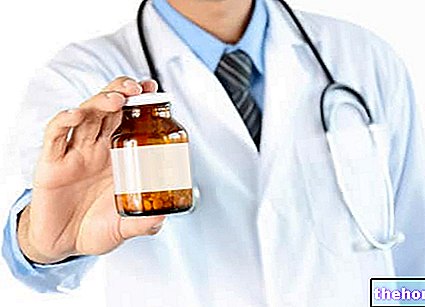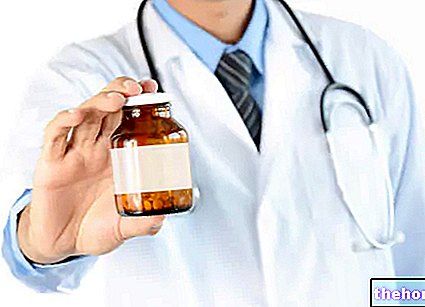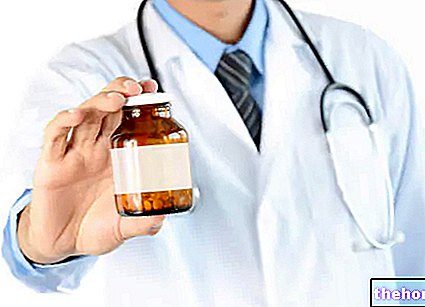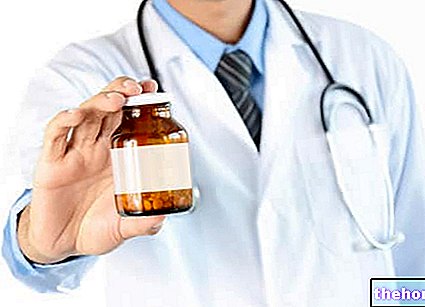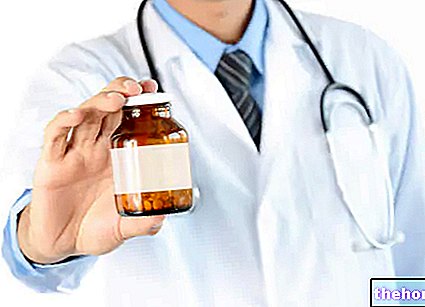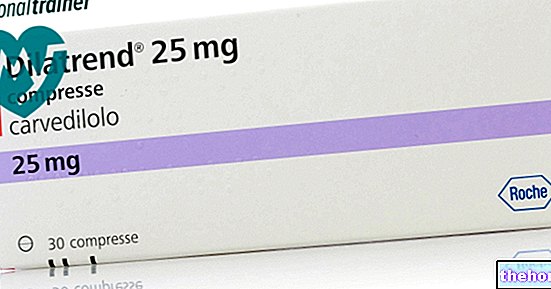Active ingredients: Ephedrine, Nafazoline
ELTARINOL 5 mg / ml + 1.25 mg / ml nasal spray, solution
Why is Deltarinol used? What is it for?
Deltarinol is a medicine for nasal use that contains two active ingredients: ephedrine and naphazoline, which belong to the category of nasal decongestants, which are used to decrease or eliminate swelling of the mucous membranes of the nose (decongest).
This medicine is used to clear (decongest) a stuffy nose.
Talk to your doctor if you do not feel better or if you feel worse after 4 days of treatment.
Contraindications When Deltarinol should not be used
Do not use Deltarinol
- if you are allergic to ephedrine, naphazoline or any of the other ingredients of this medicine;
- if you suffer from any of the following diseases:
- heart disease,
- severe high blood pressure (arterial hypertension),
- eye disease in which you have increased pressure in the eye (acute angle-closure glaucoma),
- excessive production of thyroid hormones (hyperthyroidism),
- enlarged prostate (prostatic hypertrophy),
- tumor of an internal organ called the adrenal gland (pheochromocytoma),
- diabetes mellitus;
- if you are "under 12 years of age (see" Children and adolescents ");
- if you are undergoing treatment with antidepressant medicines or are within two weeks of stopping antidepressant treatment;
- if you are pregnant and / or breastfeeding (see "Pregnancy and breastfeeding").
Precautions for use What you need to know before taking Deltarinol
Talk to your doctor or pharmacist before using Deltarinol:
- if you suffer from kidney failure (reduced kidney function);
- if you are an elderly person, due to the danger of urinary retention;
- if you suffer from cardiovascular diseases (diseases affecting the heart and / or blood vessels);
- if you suffer from hypertension (high blood pressure), even if it is not severe.
Prolonged use of medicines that constrict blood vessels, such as Deltarinol, (vasoconstrictor medicines) can alter the normal function of the mucous membrane and the nasal cavities (sinuses), even causing addiction to the medicine (reduced effectiveness). Repeating the intake for long periods can be harmful.
The use, especially if prolonged, of the products that are administered locally on the mucous membranes can cause an allergic reaction (sensitization); in this case, stop the treatment and contact your doctor. However, in the absence of a complete therapeutic response within a few days, consult the doctor.
In patients with cardiovascular diseases (diseases affecting the heart and / or blood vessels), especially in hypertensive patients (patients with high blood pressure), the use of nasal decongestants must in any case be subjected to the judgment of the doctor from time to time. Take care and tell your doctor right away if you experience difficulty in breathing and chest pain.
The medicinal product must not be used orally: accidental oral use can cause toxic phenomena. Avoid contact of the liquid with the eyes. Long-term use in excessive doses can cause toxic phenomena.
Attention for those who practice sports: the medicine contains substances prohibited for doping. It is forbidden to take "different doses, by dosage and by route of administration, from those reported (see" How to use Deltarinol ").
Children and adolescents
The medicine is contraindicated in children under 12 years of age (see "Do not use Deltarinol"). Accidental ingestion in children can cause an excessive tranquilizing effect (marked sedation).
Interactions Which drugs or foods can modify the effect of Deltarinol
Tell your doctor or pharmacist if you are using, have recently used or might use any other medicines, even those without a prescription.
Do not use Deltarinol if you are taking antidepressant medicines and not even within two weeks after stopping antidepressant therapy (see "Do not use Deltarinol").
Take special care if you are taking the following medicines at the same time:
- antihypertensives (used against high blood pressure): the ephedrine contained in Deltarinol may reduce the effectiveness of some of these medicines; instead associated with clonidine (an antihypertensive), it can cause a rise in blood pressure.
- Non Steroidal Anti-Inflammatory Drugs (NSAIDs): the association with ephedrine can favor the onset of lesions in the gastric mucosa.
- Corticosteroids (cortisone-like drugs): Ephedrine may reduce the effectiveness of these drugs. If you suffer from asthma and are being treated with corticosteroids, avoid taking medicines that contain ephedrine.
- Acetazolamide (diuretic), antacids, ammonium chloride and sodium bicarbonate: these are drugs that slow down the elimination of ephedrine in the urine.
- Digoxin (heart medicine), cyclopropane (a medicine to induce anesthesia), phenylpropanolamine and pseudoephedrine (nasal decongestants): co-administration with ephedrine increases the risk of side effects affecting the heart and / or blood vessels.
- Reserpine (antihypertensive and antipsychotic): may reduce the efficacy of ephedrine.
- Theophylline (used for respiratory diseases): Concomitant use of ephedrine may cause an increased incidence of gastrointestinal and nervous system side effects.
- Caffeine: the association with ephedrine can potentiate some effects on the nervous system (sympathomimetic effects) of ephedrine.
Warnings It is important to know that:
Pregnancy and breastfeeding
Do not use Deltarinol during pregnancy and breastfeeding. Avoid the use of the medicine even if you suspect you are pregnant or want to plan a maternity leave.
Driving and using machines
Deltarinol does not affect the ability to drive or use machines.
Deltarinol contains methyl p-hydroxybenzoate and propyl p-hydroxybenzoate (parabens) which may cause allergic reactions (even delayed) and, exceptionally, bronchospasm (narrowing of the bronchi with severe breathing difficulties).
Dosage and method of use How to use Deltarinol: Dosage
Always use this medicine exactly as described in this leaflet or as directed by your doctor or pharmacist. If in doubt, consult your doctor or pharmacist.
The recommended dose is one spray every 3-4 hours up to 4 times a day. Spray inside the nostrils only once.
Warning: strictly adhere to the recommended doses. A higher dosage of the medicine, even if taken nasally and for a short period of time, can cause serious effects on the body.
Do not continue the treatment for more than 4 days.
Use only for short periods of treatment: use for a long time in excessive doses can cause toxic phenomena.
For a correct use of the nebulizer please observe the following:
For nebulizations
- Without tilting your head back, introduce the cone of the nebulizer into the nostril and press the central part of the side walls of the bottle with quick and energetic strokes.
The bottle of Deltarinol contains the amount of 15 ml of liquid.
The air space above the liquid is absolutely necessary for a perfect functioning of the bottle.
To open the bottle
- Tear off the tongue.
- Press the cap and simultaneously rotate counterclockwise.
If you forget to use Deltarinol
Do not use a double dose to make up for a forgotten dose. If you have any further questions on the use of this medicine, ask your doctor or pharmacist.
Overdose What to do if you have taken too much Deltarinol
If you have taken a very high dose than the recommended dose, arterial hypertension (high blood pressure), tachycardia (palpitations), photophobia (sensitivity to light), severe headache (headache), chest tightness, psychiatric reactions and, children, hypothermia (lowering of body temperature) and severe depression of the central nervous system with marked sedation: in case of accidental ingestion or intake of an excessive dose of the medicine, notify your doctor immediately or go to the nearest hospital.
Side Effects What are the side effects of Deltarinol
Like all medicines, this medicine can cause side effects, although not everybody gets them.
The medicine can facilitate the onset of local allergies (sensitization phenomena) and worsen the congestion of the mucous membranes of the nose.
After administration of Deltarinol, the following side effects may occur:
- rapid heartbeat (tachycardia),
- anxiety,
- restlessness,
- insomnia.
- nausea,
- headache,
- sense of dizziness,
- tremors,
- dry mouth,
- urinary disorders,
- changes in blood circulation in the limbs,
- high blood pressure (arterial hypertension),
- slow heart rate (bradycardia),
- irregular heartbeat (heart arrhythmias).
Reporting of side effects
If you get any side effects, talk to your doctor or pharmacist. This includes any possible side effects not listed in this leaflet. You can also report side effects directly via the national reporting system at www.agenziafarmaco.it/it/responsabili. By reporting side effects you can help provide more information on the safety of this medicine.
Expiry and Retention
Keep this medicine out of the sight and reach of children.
Do not use this medicine after the expiry date which is stated on the package. The expiry date refers to the last day of that month.
Store below 25 ° C.
Do not throw any medicines via wastewater or household waste. Ask your pharmacist how to throw away medicines you no longer use. This will help protect the environment.
Other information
What Deltarinol contains
- The active ingredients are ephedrine hydrochloride and naphazoline nitrate. 100 ml of solution contain 500 mg of ephedrine hydrochloride and 125 mg of naphazoline nitrate.
- The other ingredients are: methyl-p-hydroxybenzoate, propyl-p-hydroxybenzoate, sodium edetate, monobasic sodium phosphate, sodium phosphate, sodium hydroxide, purified water.
What Deltarinol looks like and contents of the pack
Nasal spray, solution.
The pack contains a bottle of nasal spray containing 15 ml of solution. The plastic bottle is equipped with a nebulizer.
Source Package Leaflet: AIFA (Italian Medicines Agency). Content published in January 2016. The information present may not be up-to-date.
To have access to the most up-to-date version, it is advisable to access the AIFA (Italian Medicines Agency) website. Disclaimer and useful information.
01.0 NAME OF THE MEDICINAL PRODUCT
DELTARINOL 5 MG / ML + 1.25 MG / ML NASAL SPRAY, SOLUTION
02.0 QUALITATIVE AND QUANTITATIVE COMPOSITION
100 ml of solution contain:
Active principles: Ephedrine hydrochloride 0.500 g; Naphazoline nitrate 0.125 g.
Excipients with known effects: methyl p-hydroxybenzoate and propyl p-hydroxybenzoate.
For the full list of excipients, see section 6.1.
03.0 PHARMACEUTICAL FORM
Nasal spray, solution.
04.0 CLINICAL INFORMATION
04.1 Therapeutic indications
Decongestant of the nasal mucosa.
04.2 Posology and method of administration
DELTARINOL should be applied every 3-4 hours up to 4 times a day; only one spray is sufficient. Strictly adhere to the recommended doses. A higher dosage of the product even if taken topically and for a short period of time can give rise to serious systemic effects.
04.3 Contraindications
Hypersensitivity to the active substances or to any of the excipients listed in section 6.1, heart disease and severe arterial hypertension, acute narrow-angle glaucoma, hyperthyroidism, prostatic hypertrophy, pheochromocytoma, diabetes mellitus, pregnant or presumed or pregnant women feeding time. The drug is contraindicated in children under 12 years of age. Do not administer during or in the two weeks following antidepressant drug therapy.
For those who carry out sporting activities: see point 4.4.
04.4 Special warnings and appropriate precautions for use
The prolonged use of vasoconstrictors can alter the normal function of the mucous membrane of the nose and paranasal sinuses, also inducing addiction to the drug. Repeating applications for long periods can be harmful. Use with caution in patients with renal insufficiency and, due to the danger of urinary retention, in the elderly. The use, especially if prolonged, of topical products can give rise to sensitization phenomena; in this case it is necessary to interrupt the treatment and, if necessary, institute a suitable therapy. However, in the absence of a complete therapeutic response, within a few days, consult your doctor; in any case, the treatment must not be continued for more than four days.
In patients with cardiovascular diseases, especially those with hypertension, the use of nasal decongestants must in any case be subjected to the judgment of the physician from time to time.
Cardiovascular effects may be observed with the use of sympathetic mimetic drugs, such as DELTARINOL. There is some evidence from post-marketing data and published literature of rare cases of myocardial ischaemia in association with the use of beta agonists.
Patients with pre-existing severe heart disease (e.g. ischemic heart disease, arrhythmia or severe heart failure) taking deltarin should be advised to seek medical attention if they experience chest pain or other symptoms of worsening heart disease.
Attention should be paid to the evaluation of symptoms such as dyspnoea and chest pain, as they can be of both respiratory and cardiac origin.
Strictly follow the recommended doses. The product, if accidentally ingested or if used for a long time in excessive doses, can cause toxic phenomena. It should be kept out of the reach of children as accidental ingestion can cause marked sedation.
It must not be used orally.
Avoid contact of the liquid with the eyes.
Attention for those who carry out sports activities: the product contains substances prohibited for doping. It is "forbidden" to take other than those reported by dosage schedule and route of administration.
Due to the presence of methyl-p-hydroxybenzoate and propyl-p-hydroxybenzoate as excipients, they are possible allergic reactions, even of a delayed type.
Ephedrine can be a substance prone to abuse.
04.5 Interactions with other medicinal products and other forms of interaction
The active ingredients contained in DELTARINOL can negatively interact with antidepressant drugs. Consequently, the administration of the product during or in the two weeks following antidepressant drug therapy is contraindicated.
Ephedrine may reduce the pharmacological efficacy of antihypertensive drugs; associated with clonidine, it can cause an increase in noradrenaline levels and a rise in blood pressure. If associated with NSAIDs, it can favor the onset of lesions in the gastric mucosa. Ephedrine can increase the metabolism of corticosteroids, reducing their plasma levels. Asthma patients treated with these drugs should therefore avoid the intake of products based on ephedra.
The urinary excretion of ephedrine is pH dependent; acetazolamide, antacids, ammonium chloride and sodium bicarbonate are able to alkalize the urine, and consequently slow down the elimination of ephedrine.
The concomitant combination of ephedrine with digoxin, phenylpropanolamine, cyclopropane and pseudoephedrine is associated with an increased risk of adverse cardiovascular events. Reserpine, by causing norepinephrine depletion, may reduce the efficacy of ephedrine. central and gastrointestinal adverse effects, which occur following the administration of ephedrine. The combination of ephedrine and caffeine may potentiate the sympathomimetic effects of ephedrine.
04.6 Pregnancy and breastfeeding
The use of the product in women who are pregnant or presumed pregnant or who are breastfeeding is contraindicated.
04.7 Effects on ability to drive and use machines
DELTARINOL does not affect the ability to drive or use machines.
04.8 Undesirable effects
The product can locally determine sensitization phenomena and congestion of the rebound mucous membranes.
After topical use of naphazoline, systemic effects such as nausea, headache and dizziness have been reported.
After administration of ephedrine, the most common adverse events reported are tachycardia, anxiety, restlessness and insomnia. Tremors, dry mouth, urination disturbances, circulatory changes in the extremities, high blood pressure, reflex bradycardia, and cardiac arrhythmias may also occur.
Reporting of suspected adverse reactions
Reporting of suspected adverse reactions occurring after authorization of the medicinal product is important as it allows continuous monitoring of the benefit / risk balance of the medicinal product. Healthcare professionals are asked to report any suspected adverse reactions via the national reporting system. "address: www.agenziafarmaco.gov.it/it/responsabili.
04.9 Overdose
In case of overdose, or accidental ingestion, arterial hypertension, tachycardia, photophobia, intense headache, chest tightness, psychiatric reactions and, in children, hypothermia and severe depression of the central nervous system with marked sedation may appear, requiring the adoption of adequate emergency measures.
05.0 PHARMACOLOGICAL PROPERTIES
05.1 Pharmacodynamic properties
Pharmacotherapeutic group: rhinological preparations - decongestants, ATC code: R01AB05
The two drugs present in the formulation of DELTARINOL (ephedrine hydrochloride and naphazoline nitrate), due to their vascular action carried out on the alpha receptors (prompt but transitory action of ephedrine and prolonged action of naphazoline) cause a marked vasoconstriction in the inflamed nasal mucosa.
Ephedrine belongs to the group of sympathomimetic drugs, active on the adrenergic nerve endings and on the effector structures innervated by them. The drug stimulates both alpha and beta receptors and has various uses in the clinic. After local application, ephedrine causes vasoconstriction such as consequence of the peripheral sympathomimetic activity of the compound. The pharmacological action of ephedrine differs from that of adrenaline above all for the power of action, for the longer duration of activity and for the more marked central action.
Naphazoline also belongs to the group of sympathomimetic drugs, the use of which is mainly that of vasoconstrictor for local application on the nasal mucosa. The drug, like other imidazoline derivatives, is devoid of beta-sympathomimetic actions and acts specifically on alpha receptors. The action on the vascular system is characterized by a contraction of the peripheral vessels which occurs rapidly and is less pronounced but more lasting than that of adrenaline.
Studies conducted directly with DELTARINOL, by means of the perfusion method of isolated rabbit ear, have confirmed, with dose-dependent effects, the vasoconstrictive action of the two drugs. Other researches carried out in the guinea pig have shown that the preparation does not cause drug-allergic reactions, even in different experimental conditions as regards the induction of the state of sensitization and the triggering treatment.
05.2 Pharmacokinetic properties
Ephedrine is rapidly absorbed from the gastrointestinal tract, as well as naphazoline which, as is known, is not used in systemic medicine. However, the possibility that the two drugs can be absorbed by the nasal mucosa or by the gastrointestinal tract , during the practical application of the product, are very poor in light of the analytical results of the dosage of the serum concentrations of ephedrine and naphazoline in animals treated with DELTARINOL for prolonged administration. In fact, the data of the tests performed in the rabbit for treatments of 5 consecutive weeks with doses of the product equal to about nine times higher than those used in humans, have shown that the absorption of the two drugs is incomplete (serum concentrations mostly below the sensitivity limit of the method used) and that accumulation phenomena occur.
05.3 Preclinical safety data
The examination of the literature data on ephedrine and naphazoline reveals the low acute toxicity of the two drugs in relation to the doses recommended in the clinic and the possibility that quantities of these substances are absorbed following the instillation and nebulization of the product.
For ephedrine, the LD50 calculated in the various animal species was oral of 400 and 600 mg / kg respectively in mice and rats, intravenously of 74 mg / kg in mice and subcutaneously in rats of 300 mg / kg. kg and 420 mg / kg in the guinea pig The minimal lethal dose was found by the subcutaneous and endoperitoneal routes of 1000 and 170 mg / kg in the mouse, 320 and 170 mg / kg in the rat and 320 and 310 mg / kg in the rabbit, respectively; intravenously, the minimum lethal dose was 130, 50, 70, 60 mg / kg in rats, guinea pigs, dogs and cats, respectively.
For naphazoline, the LD50 was subcutaneously equal to 514, 385 and 0.950 mg / kg in mice, rats and rabbits, respectively, and intravenously equal to 170 and 0.80 mg / kg in mice and rabbits, respectively.
In comparison with the dosages indicated in the clinic, the maximum daily quantity of DELTARINOL that could be instilled intranasally in man corresponds to 0.2 mg / kg of ephedrine hydrochloride and 0.05 mg / kg of naphazoline nitrate.
The toxicity of the combination ephedrine + naphazoline was studied in animals by prolonged experiments carried out in rabbits by intranasal administration of DELTARINOL for 5 consecutive weeks at significantly higher doses (3 and 9 times) than the maximum ones used in humans. The results of these tests demonstrated the excellent tolerability of the product both locally and systemically, as deduced from the behavioral, haematological, haematochemical and necropsy tests, the weight determination of the main thoracic-abdominal organs and the histological examinations of the nasal mucosa, laryngeal and pharyngeal.
However, in man it is advisable to strictly adhere to the recommended doses. The product, if accidentally ingested or if used for a long time in excessive doses, could cause toxic phenomena, despite the good results achieved in the animal.
06.0 PHARMACEUTICAL INFORMATION
06.1 Excipients
Methyl p-hydroxybenzoate, propyl p-hydroxybenzoate, sodium edetate, monobasic sodium phosphate, sodium phosphate, sodium hydroxide, purified water.
06.2 Incompatibility
Not relevant.
06.3 Period of validity
3 years.
06.4 Special precautions for storage
Store at a temperature not exceeding 25 ° C.
06.5 Nature of the immediate packaging and contents of the package
Nebulizer bottle containing 15 ml of liquid for nasal use.
06.6 Instructions for use and handling
No special instructions.
07.0 MARKETING AUTHORIZATION HOLDER
Sanofi S.p.A.
Viale L. Bodio 37 / b - 20158 Milan
08.0 MARKETING AUTHORIZATION NUMBER
AIC 012811016
09.0 DATE OF FIRST AUTHORIZATION OR RENEWAL OF THE AUTHORIZATION
Last renewal date: 01.06.2010

